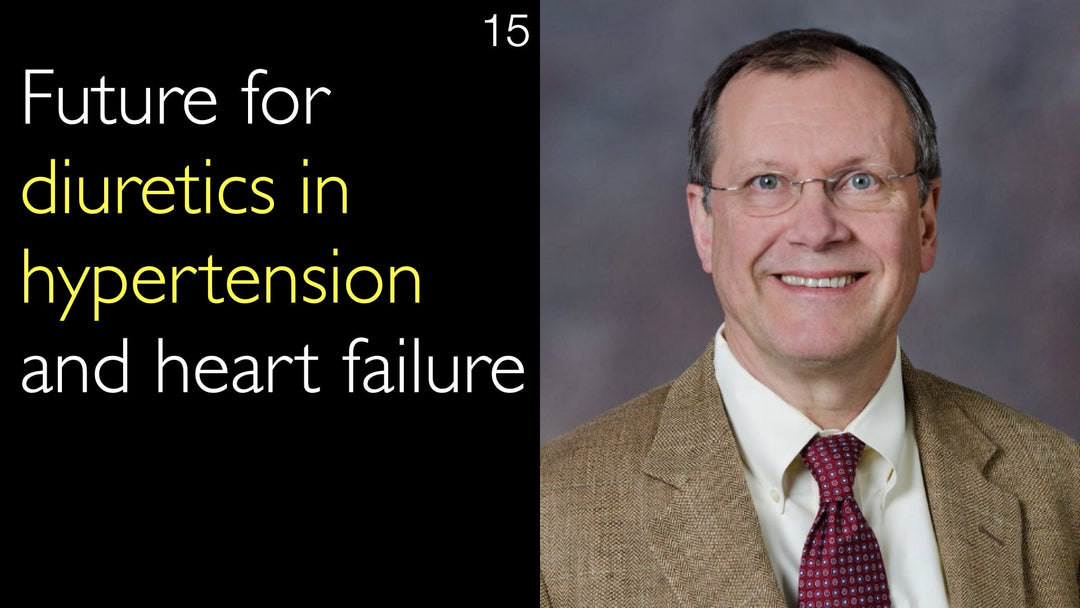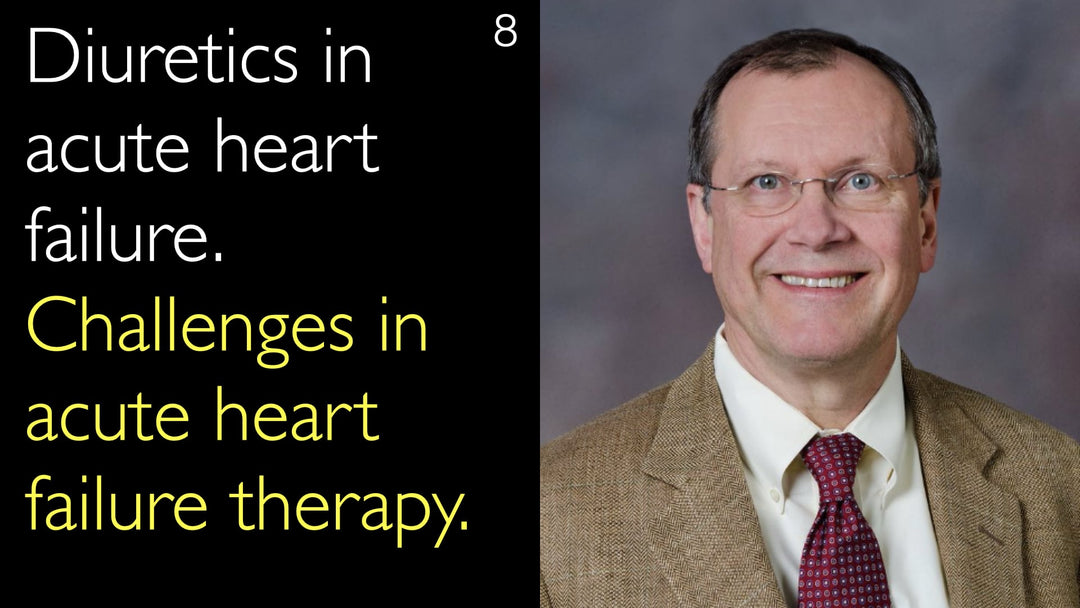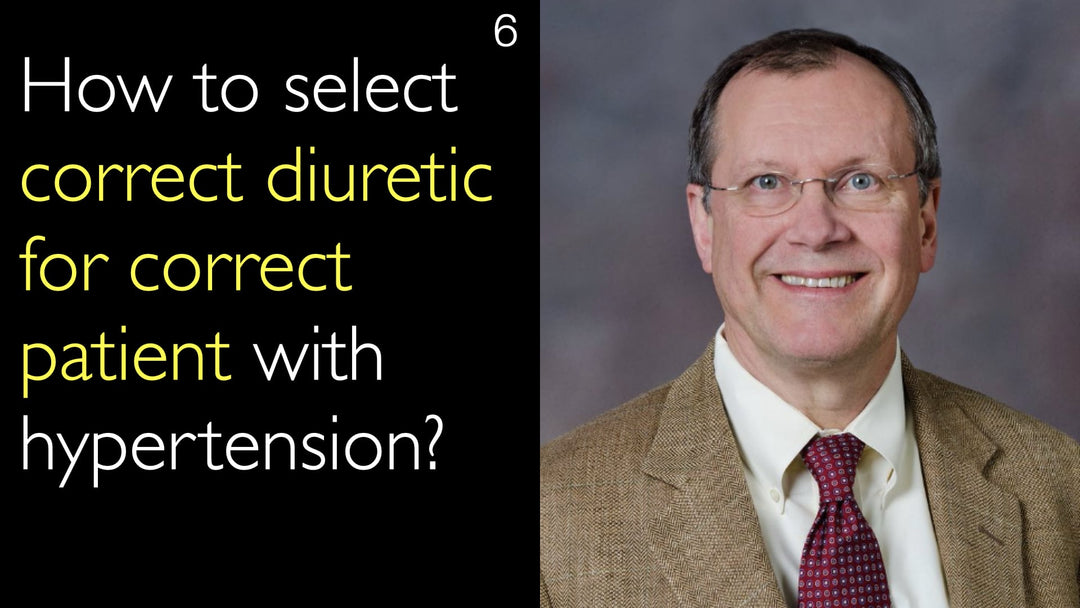Leading expert in hypertension and heart failure, Dr. David Ellison, MD, explains the enduring role of diuretics in treatment. He discusses the future of these medications over the next decade. Dr. David Ellison, MD, highlights the development of new drugs like Finerenone. This nonsteroidal mineralocorticoid receptor blocker may offer benefits with fewer side effects. He emphasizes the need to prevent acute decompensated heart failure. Optimizing diuretic use remains a critical clinical goal.
Future of Diuretic Therapy in Hypertension and Heart Failure Management
Jump To Section
- Enduring Role of Diuretics
- Finerenone Innovation
- Hyperkalemia Challenge
- Optimizing Diuretic Use
- Preventing Heart Failure Decompensation
- Future Treatment Directions
- Full Transcript
Enduring Role of Diuretics
Dr. David Ellison, MD, explains that diuretics have been used for over 50 years. They remain remarkably effective for hypertension and heart failure treatment. Diuretics have a long history in medicine. Paracelsus, the Father of Pharmacology, used mercury as a diuretic centuries ago. Dr. David Ellison, MD, states that we are unlikely to move away from diuretic drugs entirely. He believes the future lies in new approaches and better ways to use existing medications.
Finerenone Innovation
Dr. David Ellison, MD, discusses Finerenone as a significant advancement. This nonsteroidal mineralocorticoid receptor blocker differs from traditional steroid antagonists. Finerenone may have a different mechanism of action compared to older drugs. Dr. Ellison suggests it could provide more beneficial effects with fewer adverse outcomes. The drug targets aldosterone effects throughout the body. This includes actions on blood vessels, the brain, and the kidneys.
Hyperkalemia Challenge
Hyperkalemia is a major side effect of mineralocorticoid receptor blockers. Dr. David Ellison, MD, notes that many patients cannot use these drugs due to high potassium levels. Current solutions involve medications that bind potassium in the gut. Dr. Ellison describes this as a workaround rather than addressing the fundamental problem. He hopes future drugs like Finerenone can block receptors in specific organs. This could reduce hyperkalemia risk while maintaining therapeutic benefits.
Optimizing Diuretic Use
Dr. David Ellison, MD, emphasizes there is significant room for improving diuretic use. These drugs have been utilized for almost a century. Better application could enhance patient outcomes in heart failure and hypertension. Dr. Ellison points to ongoing debates in cardiology literature. Some discussions focus on weaning patients off diuretics when possible. However, he notes that most patients who can be weaned off have mild heart failure initially.
Preventing Heart Failure Decompensation
Preventing acute decompensated heart failure is a critical future goal. Dr. David Ellison, MD, stresses the importance of intervention before hospitalization becomes necessary. He believes better management can reduce hospital admissions for heart failure patients. Dr. Ellison advocates for strategies that keep patients stable on diuretics. This approach should minimize adverse compensatory changes in the body. The focus should be on long-term stability rather than short-term fixes.
Future Treatment Directions
Dr. David Ellison, MD, outlines the future direction of diuretic therapy. The goal is to achieve the benefits of diuresis without the negative side effects. He sees promise in drugs that can selectively target mineralocorticoid receptors. Future medications might block receptors in the heart or brain without causing hyperkalemia. Dr. Ellison concludes that preventing acute decompensation should be a primary focus. This approach represents the most promising future for heart failure and hypertension treatment.
Full Transcript
Dr. Anton Titov, MD: Professor Ellison, what is the future in the use of diuretics to treat hypertension and heart failure? You are a renowned expert on the intersection of these two very complex diseases. So, what's in the next 5 to 10 years?
Dr. David Ellison, MD: I think the first thing is that people have wanted for 50 years or more to get away from using diuretics. And we're still using diuretics because they are remarkably effective. Diuretics were utilized in ancient times. In fact, Paracelsus, the so-called Father of pharmacology, used mercury as a diuretic to treat edema back many hundreds of years ago.
So, I don't think we're going to get away from using diuretic drugs to treat these conditions. And I'm not sure we should want to get away. I think we're going to find new approaches to diuretics and maybe new ways to use them.
The first thing I comment on is this idea that this new drug Finerenone, which is a nonsteroidal mineralocorticoid receptor blocker. So, all the other mineralocorticoid receptor antagonists are steroid antagonists. This is a non-steroidal drug. And there is some hint that it may have a different action.
We think that aldosterone acts all over the body and has many effects that affect the blood vessels. It clearly affects the brain. It also affects the kidney. The side effects are mostly in the kidney, and it's mostly this hyperkalemia that we worry about.
Dr. David Ellison, MD: A lot of patients who would otherwise be candidates for using mineralocorticoid receptor blockers can't use them because they develop hyperkalemia. So, we can either give them these drugs that bind potassium in the gut. But that's kind of a workaround that's not really addressing the fundamental problem.
I think there is some possibility that Finerenone may have different properties that maybe have more of the good and not as much of the bad. And if Finerenone doesn't, maybe a subsequent drug will be able to, for example, block the mineralocorticoid receptors in the heart or the brain, but not cause as much hyperkalemia.
So, I think figuring out how to get the good parts of diuresis without the bad is really important. And then the second thing is just I think there's a lot of room for using these drugs better, even though they've been used for almost 100 years.
In terms of how we approach heart failure, trying to prevent the development of acute decompensated heart failure and these patients who come into the hospital, we have to do a better job of that. And I think that there's been a debate in the cardiology literature about whether it's useful to get people off of diuretics for a while if they have heart failure.
There are some patients who you can wean off diuretics. And there's been a lot of interest in that. But it's never been demonstrated that the long-term outcomes are really better in those patients. It's been shown that it's feasible that some patients can do okay without diuretics. But most of those patients have pretty mild heart failure anyways.
I do think the idea that we could find a way to keep people on diuretics without causing the adverse compensatory changes is very attractive, and it's something we should focus on. So, in heart failure, I think we should focus on before they get to the acute decompensation and try and prevent that from happening. And that's where I think the future is.






